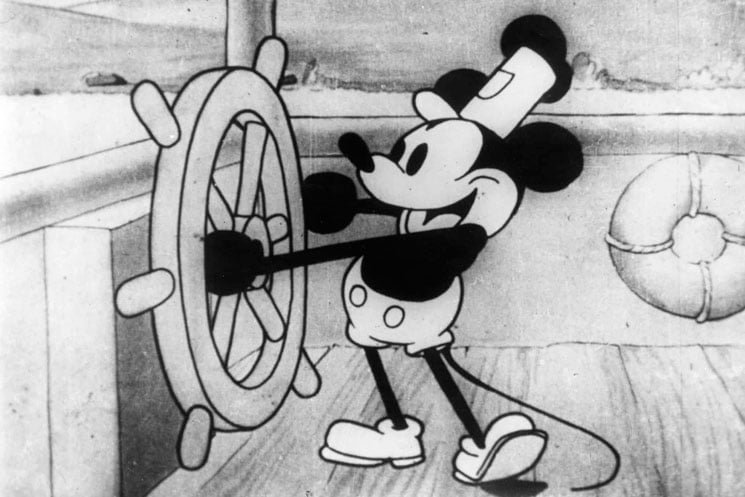The Mouse Is Free: Steamboat Willie and Intellectual Property

You’ve likely already seen him freely used across the Internet over the last two days. As of 2024, Steamboat Willie, the cartoon which introduced Mickey Mouse, entered the public domain.
This means that Steamboat Willie and its depictions of Mickey Mouse is fair game for any usage (I’d guess Disney likely will still try to be protective of modern renditions of Mickey). You can make and sell your own Steamboat-era Mickey shirts. You could produce your own Steamboat Willie shorts on TikTok. You could even release Steamboat Willie horror video games and movies (personally I recommend the title Steamboat Willies).
How did this happen? It may be hard to believe it in our regime of universal intellectual property (IP), but artistic works like drawings, art, and songs are all on the path to becoming public domain as soon as they are copyrighted.
It would be nice if I could give a simple rule explaining how many years it is before works join the public domain, but it isn’t that easy. Depending on the year the work was created and the status of authorship, the rules change. Here’s a simple chart from Wikimedia breaking down the different rules.
Of course, this chart doesn’t account for the fact that in the decades of protection, copyright laws can be changed. For example, Steamboat Willie was supposed to enter the public domain years ago, but the IP was protected by the Copyright Term Extension Act of 1998 (sometimes known as the Mickey Mouse Protection Act).
What can economics tell us about IP and the copyright system? First, we have to clarify what exactly IP laws protect.
Intellectual, Yes. But Property?
What is the basis of copyright law? On what grounds can people own an idea like Mickey Mouse? Why can’t I sell my own drawings of Mickey Mouse?
To think about this, let’s start by considering normal property. When you discover and cultivate or simply buy land, you become the owner of the land. Having the land as property is characterized by your ability to use it, transfer it via sale, or rent it out.
Owning property means that if someone tries to use your land without permission, you are within your rights to remove him from your land—using reasonable force if necessary.
Now think about intellectual property. If you create and cultivate a character like Mickey Mouse, you also have the right to use, transfer it, or rent it out. But now we run into an issue: IP is different from normal property in that someone else can, in theory, sell your IP without harming your own ability to do so.
If you’re living in a house and someone steals the deed and sells your house, you’re unable to sell it yourself anymore (provided you can’t bring the thief to justice). On the flip side, if someone copies Steamboat Willie from you and sells it, you can still sell it too. Maybe you’d be competing with the copycat, but you aren’t literally prevented from selling as in the case of the house.
This makes things tricky. To see why, think of what it would take to defend your IP from someone else copying it. If you defend your land or house, all you have to do is prevent trespassers and aggressors from trespassing on and damaging your property. You can literally fence your property.
What about IP? Well, you can’t really fence it. If I wanted to stop someone from copying Steamboat Willie, it would require me to enter someone else’s property and prevent him from drawing or selling pictures of Mickey.
Owning land means I have to be able to prevent someone else’s body from trespassing on my land. Owning an idea means I have to be able to prevent someone’s body from making particular pen strokes and auctioning them off on his or her own property. Granting IP legitimacy requires the owner to have a lot more control over what other people do than do usual property owners.
Economics does not answer the question of whether IP is morally legitimate. The fields of philosophy and religion are better suited for this question. If you’re interested in this sort of question, the primer on individual rights by my colleagues Dan and Patrick is a better place to start than here. Dan has written elsewhere regarding his view of IP in particular.
However, just because economics cannot answer questions about the moral legitimacy of IP doesn’t mean it cannot analyze the effects of IP.
In fact, analyzing the results of differing arrangements of property rights is really the thing that economics is best at. Ultimately, economics tells us how rational people interact in the context of differing rules over time. So let’s look at the tradeoffs inherent with IP.
Monopoly Mouse
So what is the impact for enforcing intellectual property? Well, IP essentially gives a company an exclusive right to sell a particular type of good. In this case, copyright over Steamboat Willie and Mickey Mouse gives Disney the right to be the only company that sells any content or merchandise involving either.
Other businesses can compete…
Read More: The Mouse Is Free: Steamboat Willie and Intellectual Property

